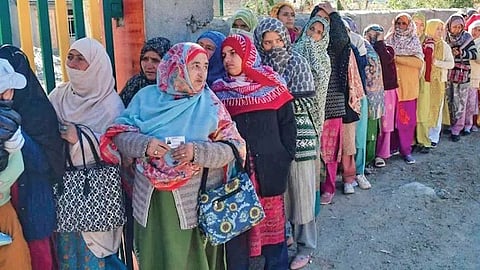

NEW DELHI: The Election Commission of India (ECI) issued an order on Monday rescheduling the poll date in 14 Assembly constituencies in three states -- Kerala, Punjab and Uttar Pradesh -- to November 20 following “large-scale social, cultural and religious engagements” of people from various communities. The by-elections were earlier scheduled for November 13.
According to the EC order, the Assembly constituencies, where the polling has been postponed to November 20, include Palakkad in Kerala; Dera Baba Nanak, Chabbewal, Gidderbaha, Barnala in Punjab; and Meerapur, Kundarki, Ghaziabad, Khair, Karhal, Sishamau, Phulpur, Katehari and Majhawan in Uttar Pradesh.
Most political parties, including the Congress, BJP, BSP and the RLD and a few other social organisations made representations to the ECI and requested for change in the poll schedule.
The Congress in its representation to the ECI highlighted the ‘Kalpathi Rastholsavam’ festival in Kerala, celebrated from November 13 to 15, which could affect voter participation in the Palakkad assembly constituency.
In Punjab, the “555th Prakash Parv of Sri Guru Nanak Dev” falls on November 15, with religious events commencing from November 13. Concerns were also raised about the impact of ‘Kartik Purnima’, celebrated on November 15, as people in Uttar Pradesh often travel during this period.
In the order, the ECI said, “Representations have been received from various recognised national and state political parties (including BJP, INC, BSP, RLD) and some social organisations for changing the date of poll in some Assembly constituencies having by-elections on November 13, considering large-scale social, cultural and religious engagements on that day which may cause inconvenience to people, give rise to various logistic issues and may lead to reduced voters participation during the poll.”
“The Commission, having considered these factors and representations, has decided to change the date of poll from 13.11.2024(Wednesday) to 20.11.2024 (Wednesday) in the 14 Assembly Constituencies,” it added.
“The date of counting and completion of poll of the above-mentioned assembly constituencies shall remain unchanged i.e. November 23 (Saturday) & 25 (Monday) respectively,” it said.
The by-elections can substantially influence the political landscape in these states. In UP, it will be the first test of the Yogi Adityanath government after the Lok Sabha polls in which the BJP yielded massive ground to the opposition Samajwadi Party led by Akhilesh Yadav. In Punjab too, the ruling AAP led by Bhagwant Mann is battling problems within AAP with ministers and MLAs, and even bureaucrats, complaining to the party leadership about the government’s alleged failure in procurement of paddy.
All four Punjab seats belong to rural areas where the dominant Jat Sikh community may influence the electoral verdict. Experts believe the poll verdict could well become a barometer to gauge the mood of the people. AAP had won 92 of the 117 assembly seats in the 2022 polls.
The BJP has 252 MLAs in the 403-member Assembly, while the Opposition INDIA bloc has 109 legislators. Out of the nine constituencies where the by-elections are due, three were with BJP, four with SP and one each with BJP allies. Rival players are deploying caste calculations.
The BJP is leaning on Chief Minister Yogi Adityanath’s theme of “batenge to katenge (divided we fall)” to weave a unifying narrative that transcends caste and communal lines. This catchphrase, a call for Hindu unity, first appeared in Adityanath’s campaign speeches in Haryana and has since spread to other poll-bound states like Maharashtra and Jharkhand.
The BJP is projecting “good governance and improved law & order” during Adityanath’s rule to win voters. The Akhilesh Yadav-led SP is focusing on its PDA (pichhda, dalit, alpsankhyak) formula, an appeal to the backward classes, SCs and minorities. With a strategic selection of four Muslim, three OBC, and two Dalit candidates across the nine seats, the SP is optimistic.